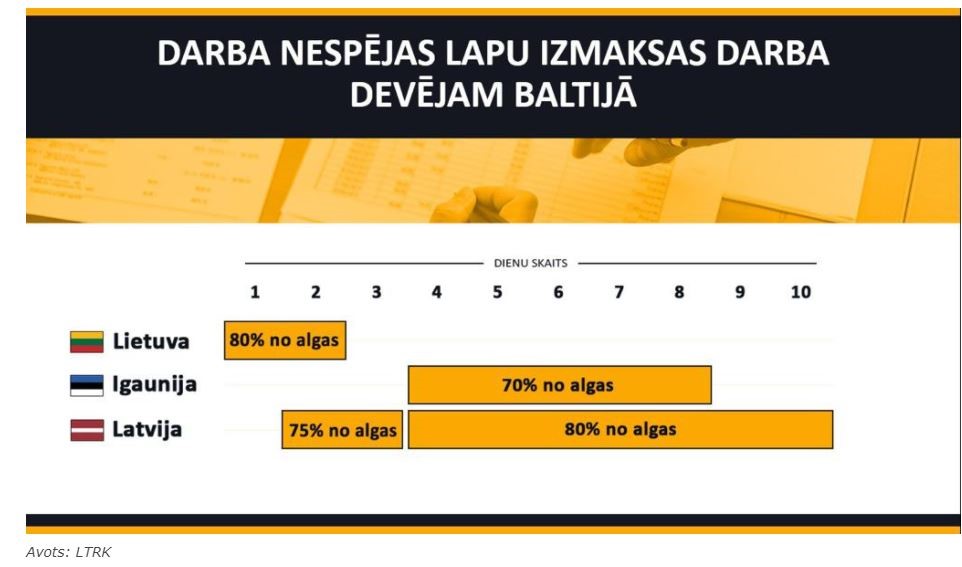Farmers' quota is full – changes must be made to the issuance of sick leave certificates
The three largest farmers' organizations – the Latvian Association of Agricultural Cooperatives, the Cooperation Council of Farmers' Organizations and the Farmers' Saeima – call on the responsible ministries, members of the Saeima and non-governmental organizations to renew the discussion on reducing the period of sick leave and making amendments to the law "On Maternity and Sickness Insurance".
Over the years, when assessing the total state tax burden to be paid by the employer or company, including the employer's mandatory state social insurance contributions, it is necessary to review the length of the period when the employer pays for sick leave. As practice shows, there are often cases when employees dishonestly use the opportunity to take sick leave, knowing that they will be paid for 9 days. If such cases are several in the company and are repeated periodically, this results in double costs for the employer: they have to pay sick leave to the employee from their own funds, as well as pay additional salary to another employee who replaces a colleague who is absent during the illness. If the 9-day paid sick leave were reduced to 3 days, employees would be limited from using it for dishonest purposes, and family doctors would have to more carefully evaluate the reasons for the need to grant a sick leave to an employee or patient.
Chairman of the Board of the Farmers' Assembly Juris Lazdins: "According to estimates by Latvian entrepreneurs, every fifth user of a sick leave certificate obtains it unjustifiably. In total, more than 70 million euros are paid out in the country for "A" sick leave benefits per year, of which more than 40 million euros in the private sector. Farmers also face unjustified issuance of sick leave certificates, although there are more problems with pre-retirement age employees, a large part of whom have chronic ailments, including occupational diseases. The state should exercise more control over the issuance of sick leave certificates. With a gross salary of 1,000 euros, a week-long sick leave costs around 355 euros. Moreover, the salary must also be paid to the sick employee's replacement, which significantly increases the cost of services or products for these companies. We must look at the Baltic region as a single market, including similar competitive conditions. Employees get sick in all countries, but unfortunately the conditions for sick leave are not the same."
Indulis Jansons, Chairman of the Board of the Latvian Agricultural Cooperatives Association: "Although Latvia has a high unemployment rate overall, finding good and responsible employees is difficult. It is difficult to maintain the quality and consistency of work in a work team if an employee who is absent due to his or her incapacity for work very often has to be replaced by a colleague or a new employee has to be hired for the time being. This causes both a great financial burden and a shortage of human resources for the company. It has also been confirmed over the years that the issuance of sick leave certificates from family doctors is easy to obtain, often without even delving into the reason for the patient's request for a sick leave certificate."
Edgars Treibergs, Chairman of the Board of the Cooperation Council of Farmers' Organizations: “It is important to realize that our entrepreneurs are the mainstay of the Latvian economy. The government must do everything to minimize the financial burden on entrepreneurs and enable them to use their financial resources more efficiently by investing in development. Currently, Latvia has the longest paid sick leave compared to Lithuania and Estonia. This needs to be changed so that we can at least compensate for the tax increase that occurred when the 2021 state budget was approved and not lose competitiveness among our closest neighbors.”
As the Estonian example shows, the employer is required to pay disability benefits only from the 4th to the 8th day. The first three days of disability are the responsibility of the employee, who, in cooperation with his/her family doctor, must determine the diagnosis that is the basis for continuing the disability. In Lithuania, the employer is required to pay disability benefits only from the 1st to the 2nd day. This period of time is optimal for the employee to assess his/her ability to return to work, and the employer has a smaller financial burden during the period of illness.


